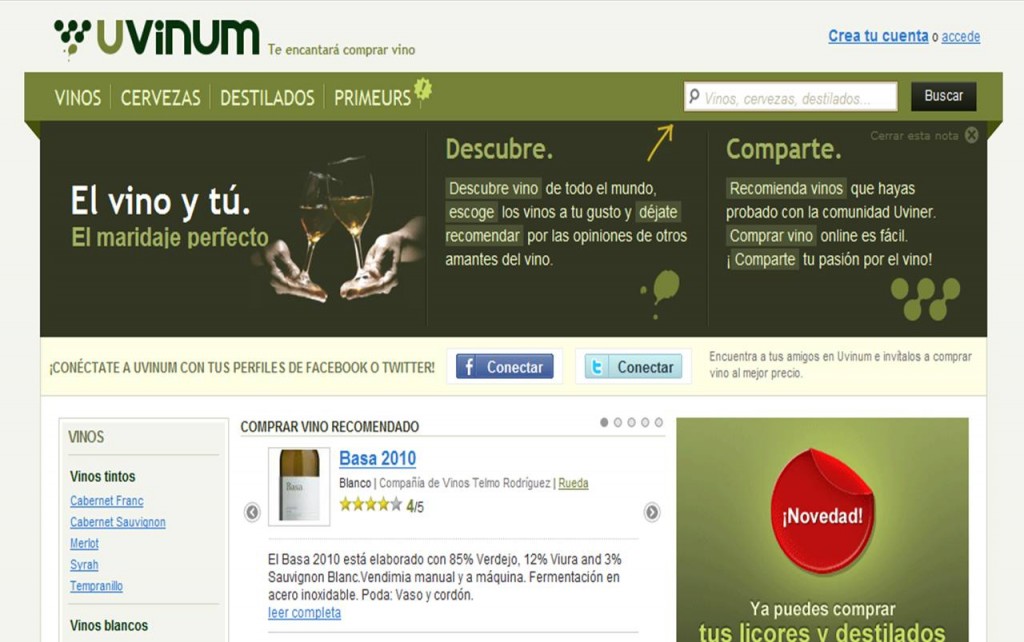Os adjunto podcast de entrevista realizada a Nico Bour de Uvinum sobre la distribución online.
Un resumen de lo que nos cuenta:
En España no llegamos al 2% de ventas online. En Francia están ya por el 5% y en USA por el 9%, y previsiblemente el 11 ó 12% el año que viene. Lo que ocurre en USA ocurrirá aquí, antes o después.
Ante estas expectativas de crecimiento han entrado muchas empresas, no solo tiendas puras online, sino tiendas tradicionales que han puesto su versión online, y distribuidores convencionales y hasta bodegas que han pasado a vender también al consumidos final. Este movimiento está cambiando las reglas de juego.
Las ventas por Internet, teniendo un enorme crecimiento no pueden ser la solución para ninguno de los jugadores tradicionales como su salida de la crisis sino una nueva oportunidad, y muy importante para generar visibilidad y marca y conseguir ventas como consecuencia de lo anterior.
El comprador por Internet se rige por otros parámetros distintos de los tradicionales. Primero busca en Google información para hacerse una idea. Y toma decisiones en función de las prescripciones que realizan personas en las que confía. Este comprador confía en este tipo de prescripción más que en la publicidad convencional, en folletos o en los grandes prescriptores del pasado.
Internet posibilita a las bodegas acceder a un colectivo mucho más amplio que antes. Desde Uvinum se anima a todo tipo de consumidores que expresen qué sensaciones les produce catar determinados vinos sin que sea necesario que su paladar, cultura o lenguaje tenga que coincidir con los de los expertos catadores, que suponen únicamente el 2% de los consumidores. Hacer de todo esto algo más sencillo no hace más que ayudar a las bodegas a difundir su discurso, su singularidad, su personalidad. Y esta parte de la esencia del Marketing del Vino.
Las bodegas tienen una historia que contar para diferenciarse de sus competidores y es Internet una herrramienta perfecta para conseguirlo.
Cuando alguien va a un hipermercado puede encontrarse con 1200 referencias. El consumidor, con una oferta tan abrumadora, se perdía. Dentro de Uvinum se da una oportunidad a los visitantes a conocer las opiniones de los expertos y no tan expertos para asesorarse y probar nuevas marcas. De dejar sus comentarios, sean o no expertos en cata. De aprovechar las recomendaciones de otros vinos que Uvinum nos hace teniendo en cuenta lo que otros usuarios similares en cuanto a gustos y preferencias a nosotros han elegido.
Con todo esto la labor de la bodega se vuelve más compleja, pero al mismo tiempo obtiene la posibilidad de ser mucho más responsable de la venta de su producto hasta el consumidor final.
Las nuevas reglas permiten a las pequeñas bodegas poder competir en un mercado cada vez más complicado siempre que no traten de seguir el mismo camino que el de las grandes bodegas.
No hay ninguna duda de que, sea cual sea el presupuesto del que disponga la bodega, siempre es más rentable invertir en comunicación dentro de la red, siempre que se haga con criterio, que hacerlo en medios convencionales.
Estos son los comentarios que me hizo Nico Bour en la entrevista, pero supongo que mejor que leer mi resumen es oir a Nico Bour con sus propias palabras.
Muchas gracias Nico por tu tiempo.
Este post en inglés: With Uvinum’s CEO Nico Bour. Talking about wine e-commerce in Spain.
Find enclosed interview with Uvinum ´s Chief Executive OfficeNico Bour on wine e-commerce (podcast)
“In Spain, less than 2% of our wine sales are online. Compare that to France which already sells 5% online and The USA is already at 9% and likely to reach 11% or 12% in the next year. And, what happens in the US, sooner or later happens here!
“With these growth expectations, many companies are beginning to sell online – and not only pure web-players but also some of the traditional wine shops and conventional wholesalers. Even a few wineries have started and this movement is already beginning to change the rules.
“However, I am sorry to say that this will not offer the solution to the crisis, but it does create a new opportunity and as importantly creates visibility and brand awareness, in addition to revenue.”
Nico continued the discussion around the customers. “The internet wine buyer is different as they are influenced by non-traditional information and settings. First he searches in Google to gather some initial ideas. Then he makes a buying decision based on information from people he trusts. This is very different to making a decision based on advertising, brochures and comments from very well known experts from the past.
“This works in two ways. Now the internet enables wineries access to a much broader customer group than before. In Uvinum we encourage visitors to express their own sensations when they taste certain wines in their own words. That is not the same as telling them what they should experience based on the palate, culture and language of expert wine tasters – which only represents 2% of consumers. Access to this other 98% allows a winery to spread their own story, uniqueness and personality – and this is the essence of wine marketing.
“The wineries have a story to tell to differentiate themselves from their competitors and the internet is the perfect medium for doing this.
“When a wine buyer goes to a supermarket, he can find about 1200 different wines. The consumer can be overwhelmed by this variety. With the help of Uvinum he has the opportunity to access advice from experts and not-so-experts and can be encouraged to try new brands. Whether or not you are an expert, you are invited to leave your comments. Uvinum can also offer recommendations of wines chosen by visitors with similar characteristics .
“Within this new world, the activity of the wineries certainly expands and becomes more complex. But at the same time, the winery then gains the opportunity to interact with the end consumer and take greater control over the sale of his product.
“These new rules allow smaller wineries to compete with the large players without following the same path as them There is no doubt that marketing budget invested in the internet potentially has far greater payback than in the more traditional media.”
These are the comments that nico Bour made to me in the interview. but I guess is better to hear Nico Bour from their own words. (if you understand Spanish. The interview is in Spanish)
Thank you Nico for your time
This post in Spanish: Entrevista a Nico Bour de Uvinum sobre Distribución online

